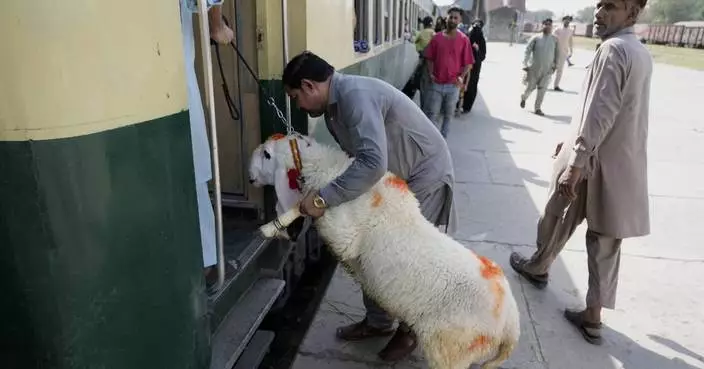A Pakistani court on Saturday sentenced a serial killer to death after finding him guilty of killing eight children, including a 7-year-old girl whose rape and murder drew nationwide condemnation and triggered violent protests, a public prosecutor said.
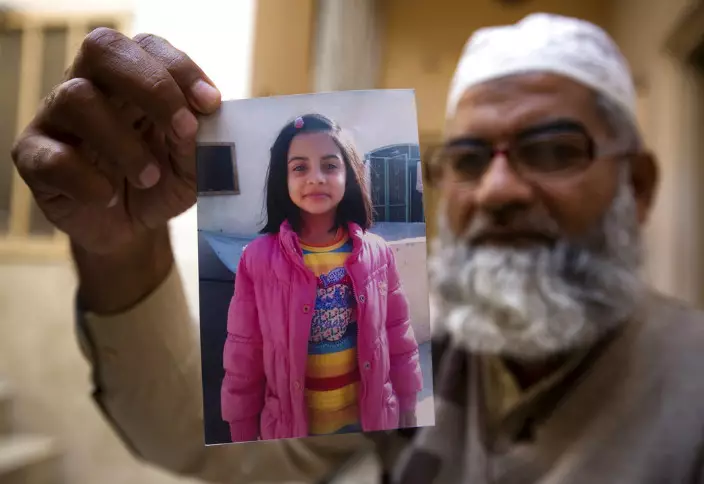
In this Thursday, Jan. 18, 2018, file photo, Mohammed Amin shows a picture of his seven year-old daughter, Zainab Ansari in Kasur, Pakistan. (AP Photo/B.K. Bangash, File)
The court announced the decision in the presence of Mohammad Imran, 24, who had pleaded guilty during the five-day trial, the public prosecutor Ehtesham Qadir told reporters outside a high-security prison in the eastern city of Lahore, where the trial was held.

Mohammed Amin, father of seven year-old girl Zainab Ansari, leaves following the court verdict, in Lahore, Pakistan, Saturday, Feb. 17, 2018. (AP Photo/K.M. Chaudary)
Imran was arrested in January, two weeks after authorities say he raped and killed 7-year-old Zainab Ansari and threw her body into a garbage dump in the city of Kasur. Angered over her murder at the time, residents attacked a police station, sparking clashes in which two persons were killed.
Zainab disappeared in the first week of January while walking to a nearby home for Quranic studies.
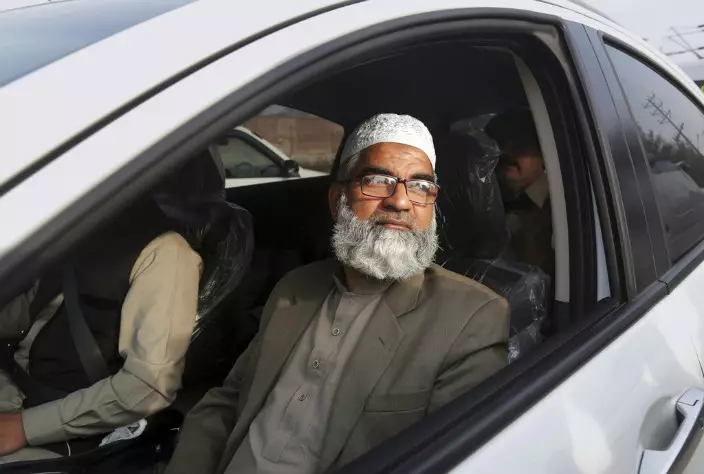
Her parents had gone to Saudi Arabia for pilgrimage at the time and she was left with relatives. They quickly returned home, but by that time their daughter's body had been found and preparations for her funeral and burial were underway amid tight security.
Since Zainab's killer left no clue, police and investigators obtained DNA samples from hundreds of suspects, and Imran's sample matched with her, leading to his arrest.
Imran confessed to the crime and said he lured the girl by telling her that her parents had come back and that she should go with him to meet them.
On Saturday, Qadir said Imran had the right to appeal, but he may not challenge the verdict as he confessed to his crimes during the trial. "Imran even today told the court that he killed the eight girls," he told reporters.
Qadir said the Imran received four death sentences from the court.
He did not say how Imran's execution would be carried out, but many Pakistanis have demanded he be publicly hanged. The horror of Zainab's killing in January was brought home for Pakistanis by a photo of her that went viral on social media, showing the smiling girl in her favorite bright pink coat, with a pink barrette holding back her hair.
TV channels aired the photo alongside pictures of her lifeless body found Jan. 9.
Shortly after Imran's conviction, Zainab's parents expressed their satisfaction, saying they received justice. However, they said Imran should be hanged in a public place so that others learn a lesson from his fate.
Imran "should be stoned to death," her mother, Nusrat Ansari, told reporters.
Zainab's father, Mohammed Amin Ansari was present when the court announced the decision. He thanked the judiciary, government and investigators for giving him speedy justice. He also called for a public execution.
"My daughter has gone, she will not come back, but I want to save daughters of other people," he said.
ISLAMABAD (AP) — The Pakistani Taliban on Monday denied involvement in a bombing attack on a police convoy that was escorting foreign ambassadors in the restive northwest, as authorities said they were still trying to determine who was behind it.
Most of the ambassadors and senior envoys were traveling with their family members on Sunday to the Swat Valley, a former stronghold of the Pakistani Taliban, when the attack occurred in Malam Jabba, one of Pakistan’s two ski resorts in Khyber Pakhtunkhwa province bordering Afghanistan.
No one claimed responsibility for the attack, but Mohammad Khurasani, a spokesman for the Pakistani Taliban, known as Tehreek-e-Taliban Pakistan, denied detonating the improvised explosive device that hit a police vehicle accompanying the convoy.
A police officer was killed and four others were wounded in the attack, which drew strong condemnation from Pakistan's President Asif Ali Zardari, Prime Minister Shehbaz Sharif and other officials.
The envoys were all unharmed, but the attack suggested there was a security breach.
“For sure it was a security breach because the convoy's route was only known to police, and the bomb disposal unit had reportedly cleared the route,” said Abdullah Khan, a defense analyst and managing director of the Islamabad-based Pakistan Institute for Conflict and Security Studies.
“Some insider (appears to have) leaked the information about the travel plans of the foreign ambassadors to the militants," he added.
Khan said the attack signaled a shift in the approach of insurgents, who previously targeted security forces.
Pakistani defense analyst Syed Muhammad Ali said there was a need for better coordination between federal authorities and police about such high-profile visits to the northwest, which has witnessed a surge in violence.
Those traveling in the convoy were ambassadors and officials from Indonesia, Portugal, Kazakhstan, Bosnia and Herzegovina, Zimbabwe, Rwanda, Turkmenistan, Vietnam, Iran, Russia and Tajikistan. All of them later returned to the capital, Islamabad, according to Pakistan's Ministry of Foreign Affairs.
In a statement, TTP said it had nothing to do with the attack. TTP is a separate group but also a close ally of the Afghan Taliban, who seized power in neighboring Afghanistan in August 2021 as U.S. and NATO troops were in the final stages of their pullout from the country after 20 years of war.
Many TTP leaders and fighters have found sanctuary and have even been living openly in Afghanistan since the Taliban takeover, which also emboldened the Pakistani Taliban. The situation has strained relations between Pakistan and Afghanistan's Taliban government, which says it does not allow anyone to use its soil for attacks against any country.
Authorities were investigating to determine whether there was a security breach, since details about the convoy's travel plans had been circulated only to officials. Authorities said they were also collecting information to determine who planted the IED device along the route.
Mohammad Ali Khan, a senior police officer, said that so far no arrest had been made.
Sunday's attack came months after a suicide bomber in northwestern Pakistan rammed his explosive-laden car into a vehicle, killing five Chinese nationals and their Pakistani driver in Shangla, a district in Khyber Pakhtunkhwa province.
The Chinese victims were construction workers and engineers who were working on Dasu Dam, the biggest hydropower project in Pakistan. Since then, Pakistan has beefed up security for foreigners and envoys traveling in the region.
Associated Press writer Riaz Khan in Peshawar, Pakistan contributed to this report.
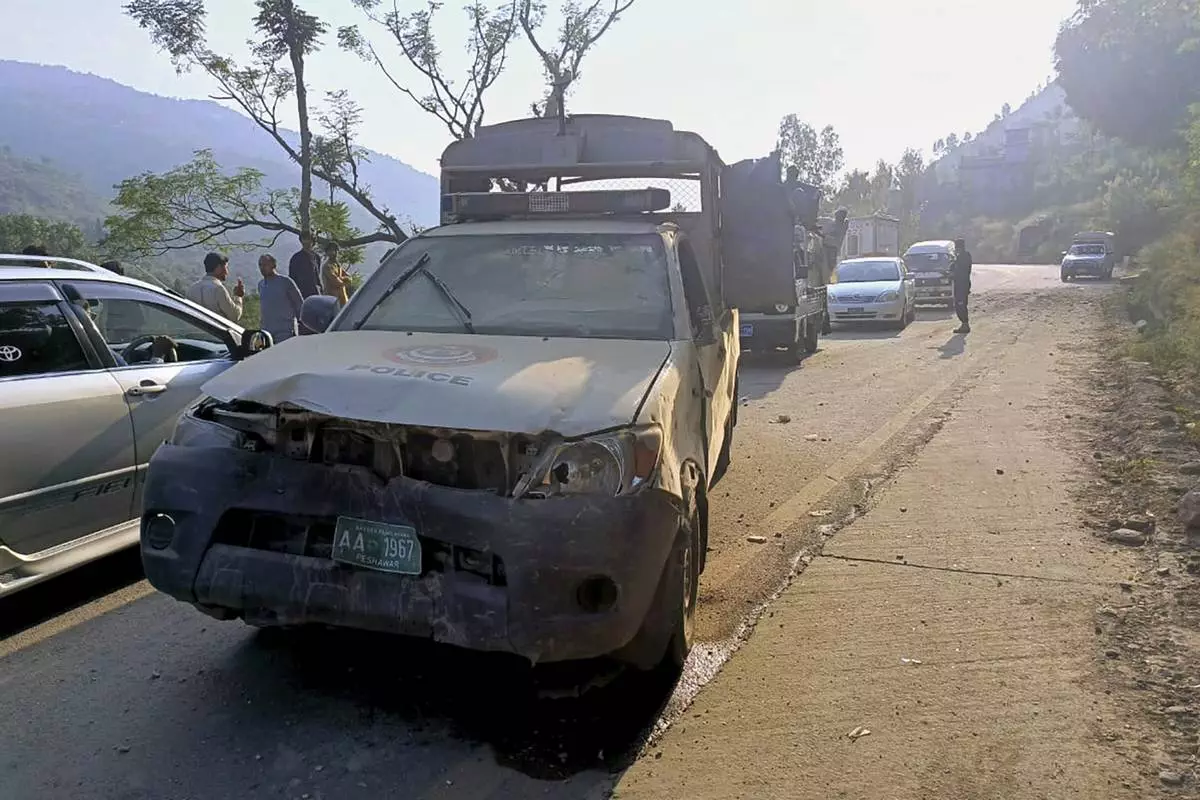
Vehicles drive past a damaged police vehicle, foreground, which was escorting a convoy of foreign diplomats, at the site of a fatal bomb explosion on a road near Malam Jabba, a tourist area in Pakistan's Khyber Pakhtunkhwa province, Sunday, Sept. 22, 2024. (AP Photo/Sherin Zada)
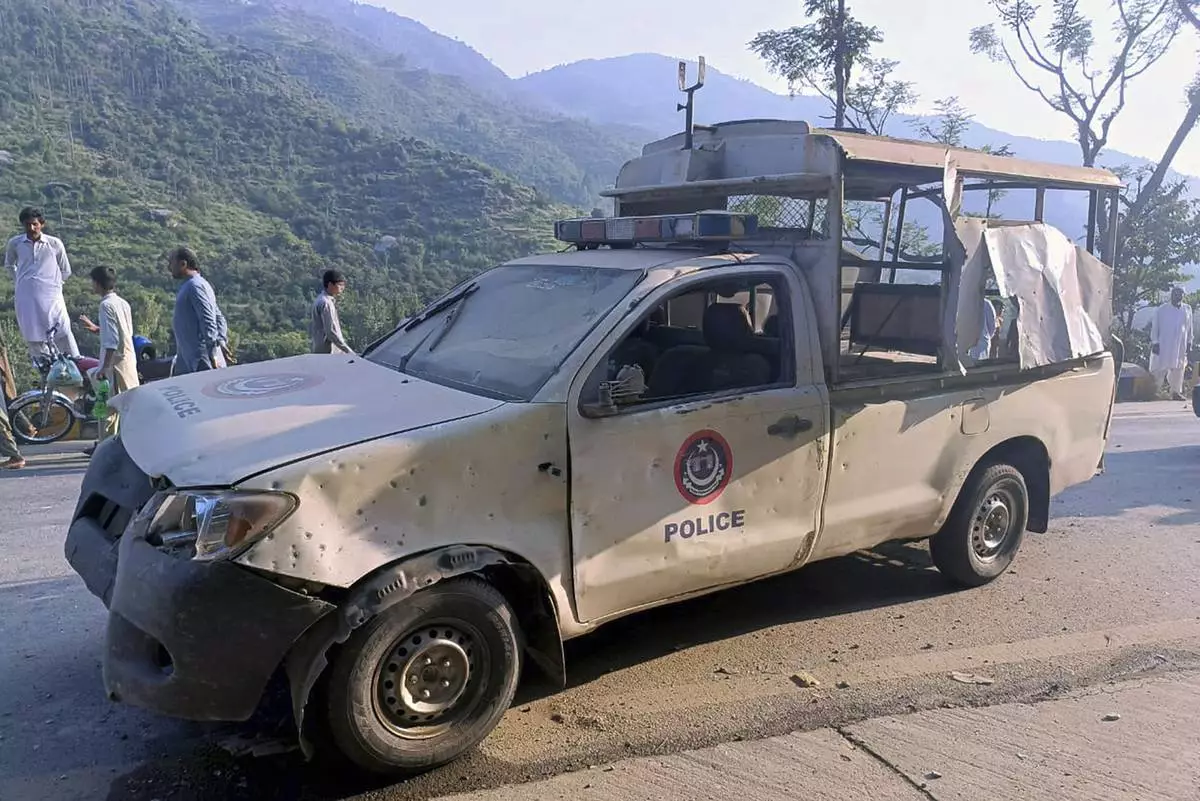
People gather near a damaged police vehicle which was escorting a convoy of foreign diplomats, at the site of a fatal bomb explosion on a road near Malam Jabba, a tourist area in Pakistan's Khyber Pakhtunkhwa province, Sunday, Sept. 22, 2024. (AP Photo/Sherin Zada)









